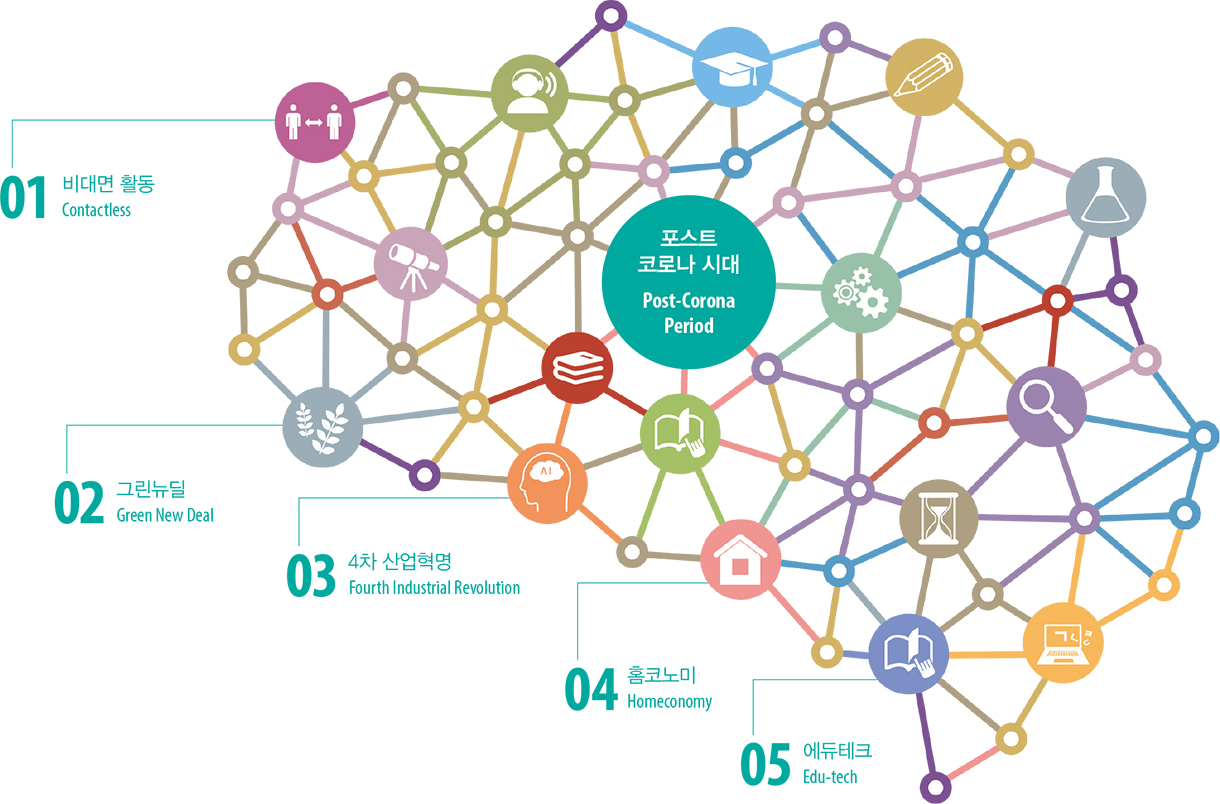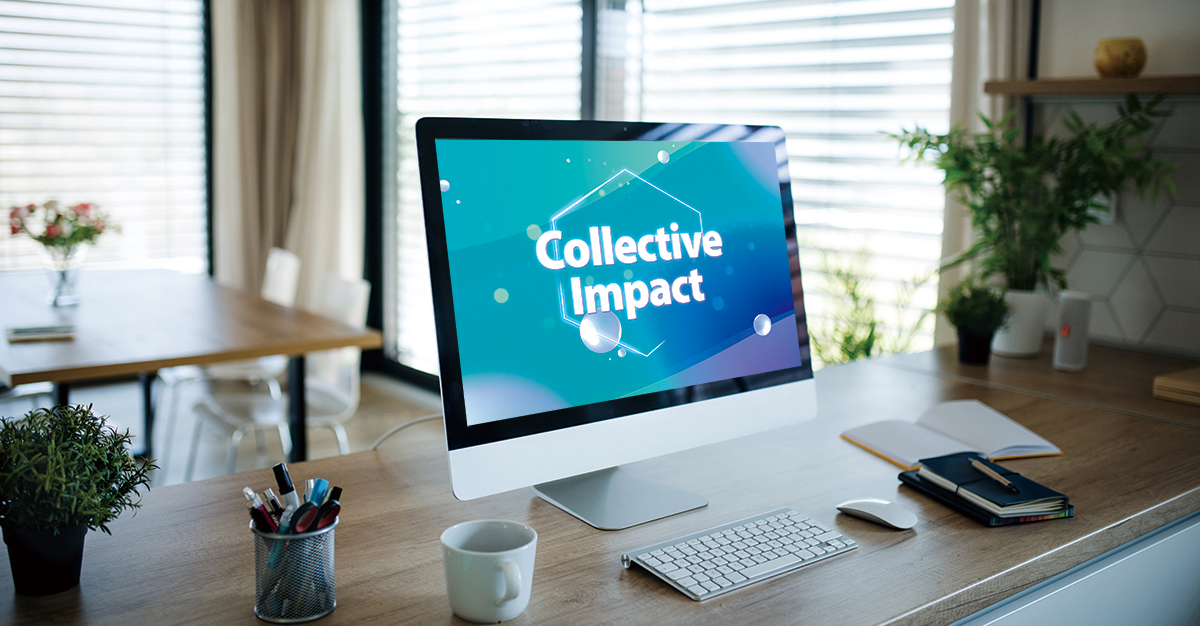Contents VOL. 257

COVER STORY
<사랑한대>가 2021년 봄호를 시작으로 <HYPER>라는 이름으로 새롭게 태어납니다. 그 첫 호 표지에는 ‘코로나19 시대의 해법’을 은유적으로 담았습니다. 포스트 코로나 시대, 과연 우리는 어떤 일상을 맞고 어떤 미래를 그려가야 할까요?

<사랑한대>가 2021년 봄호를 시작으로 <HYPER>라는 이름으로 새롭게 태어납니다. 그 첫 호 표지에는 ‘코로나19 시대의 해법’을 은유적으로 담았습니다. 포스트 코로나 시대, 과연 우리는 어떤 일상을 맞고 어떤 미래를 그려가야 할까요?
Scroll Down
The impact of COVID-19 has been more powerful than expected. In January of 2020, a 0.1 micrometer virus impacted the entire world with such devastating force, and, regardless of the gap between the rich and the poor, irrespective of gender and age, and whether one was in a developing or developed country, everyone was brought to their knees. Our everyday lives are not normal now. How should we greet the post-corona era when COVID-19 ends?
미국 존스홉킨스대학의 코로나19 현황집계에 따르면 2021년 2월 기준, 코로나로 인해 2백만 명 이상이 사망했다. 이는 벨기에의 수도인 브뤼셀 인구수와 맞먹는 수치라고 한다. 코로나가 발생한 지 1년여 만에 한 도시가 통째로 사라진 셈이다. 우리의 일상은 여기에 일일이 나열할 필요가 없을 정도로 크게 변해 버렸다. 상시 마스크 착용은 기본이고 맛집이나 카페에서의 5인 이상 모임은 불가능하다. 마땅히 할 게 없을 때 들락거리던 영화관도, 슈퍼마켓에서의 장보기도 이제는 쉽지 않다. 집 밖을 나서는 데 큰 용기가 필요해졌다.
환경 전문가는 이 모든 상황이 인간이 자초한 인재(人災)라고 말한다. 이보다 더 강력한 바이러스가 계속 발생할 것이라고, 이제 시작에 불과하다고 주저 없이 경고한다. 반갑지는 않지만 이 견해에 반박할 논리를 찾기가 쉽지 않다.
코로나19가 휩쓸고 간 뒤, 우리 사회는 이전과는 확연히 다른 모습일 것이다. 사회 전반에 ‘비대면 활동(Contactless)’이 자리 잡고, 사람과 환경이 중심이 되는 지속가능한 발전 ‘그린뉴딜(Green New Deal)’이 가속화될 전망이다. 인공지능(AI)과 사물인터넷(IoT) 등 모든 제품과 서비스를 네트워크로 연결하고 사물을 지능화하는 4차 산업혁명(Fourth Industrial Revolution)이 무르익으면서 집에서 온라인으로 모든 경제 활동과 소비를 해결하는 ‘홈코노미(Homeconomy)’, 차세대 온라인 교육을 접목한 ‘에듀테크(Edu-tech)’가 일상을 채울 것이다.
전대미문의 팬데믹 도래와 함께 무언가를 정확히 예측하고 단순한 문제를 효율적으로 해결할 방법을 찾던 시대는 지났다. 뿌연 안개 속처럼 앞이 잘 보이지 않고, 우리를 둘러싼 문제들은 점점 복잡해져 가는 뉴노멀 시대로 접어든 게 틀림없다. 무언가 답을 찾아야 한다.
그래서 우리는 모였다. 2020년 10월 말, 스탠퍼드 소셜 이노베이션 리뷰(Stanford Social Innovation Review, 이하 SSIR*)와 한양대학교, 한국사회복지협의회, 조선일보 더나은미래가 공동 주최한 ‘2020 넥스트 임팩트 콘퍼런스(Next Impact Conference)’에서 ‘콜렉티브 임팩트와 넥스트 노멀 시대(Transformation of Collective Impact for Next Normal)’란 주제로 온라인 콘퍼런스를 개최했다. 글로벌 사회혁신 매거진 편집장, 경제학자, 경영학자, 사회복지전문가, 임팩트 투자자, 글로벌기업과 대기업의 사회공헌 담당자, 소셜벤처 대표, 비영리기관 실무자 등 사회혁신 생태계의 주요 이해관계자들이 모였다. 그리고 현재를 진단하고 더 나은 세상을 만들기 위해, 우리가 나아갈 방향에 대해, 깊이 있는 대화를 나누었다. 이 콘퍼런스의 결론을 한마디로 요약하자면 이렇다.
“뉴노멀 시대를 살아가는 데 콜렉티브 임팩트(Collective Impact)가 유용한 해결책이 될 수 있을 것!”
According to a Johns Hopkins University COVID-19 status report from the U.S., as of February of 2021, more than two million people have died from COVID-19. This is said to be the equivalent of the population of Brussels, the province of Belgium. Ever since the start of COVID-19, an entire city has vanished in just one year. Our lives have changed so much so that it is too daunting of a task to list them all here. It has become standard to wear a mask at all times, and gathering more than 5 people as a party at restaurants or cafes is not allowed in Korea. It is no longer easy to visit a familiar movie theater when there is nothing to do or even shop at a grocery store. It now requires great courage to leave the house.
Environmental experts have stated that all of these situations are man-made disasters created by humans themselves.They warn us, without hesitation, that stronger viruses will continuously appear, and that this is just the beginning.
After COVID-19 sweeps across the world, our society will be quite different than before. ‘Contactless’ is expected to take place throughout society, and the sustainable development ‘Green New Deal,’ which has humans and the environment as its core, will be accelerated. As the Fourth Industrial Revolution, which connects all products and services such as AI and IoT with networks, solves all economic activity and consumption online at home. ‘Homeconomy’ and ‘Edu-tech,’ which combines next-generation online education, will fill our daily lives.
With the advent of an unprecedented pandemic, the era of accurately predicting something or effectively solving simple tasks have passed. Amidst an unclear situation, where we cannot clearly look into our future, the problems surrounding us are no doubt heading in the direction of the new-normal era. We need to find an answer.
This is why we gathered together. In late October of 2020, at the “2020 Next Impact Conference,” jointly hosted by the Stanford Social Innovation Review (hereinafter SSIR*), Hanyang University, the Korea National Council on Social Welfare, the Chosun Daily for a Better Future, held an online conference with the topic of “Transformation of Collective Impact for the Next Normal.” Major social innovation field faculties, such as the Global Social Innovation Magazine editor in chief, economists, business administrators, social welfare experts, impact investors, social contribution managers from global companies and large firms, social venture representatives, hands-on workers from non-government organizations, all gathered. They diagnosed the present state and deeply discussed the path that we should take to make a better future. The conclusion of the conference can be summarized into this one sentence.
“May the Collective Impact be a valuable solution to live in the new-normal era!”

콜렉티브 임팩트란 무엇인가? 이는 2011년 겨울 SSIR에 존 카니아(John Kania)와 마크 크레이머(Mark Kramer)가 처음 소개한 개념으로 해당 아티클은 지금까지 전 세계에서 100만 건 이상 다운로드 됐다. 콜렉티브 임팩트는 어렵고 복잡한 사회 문제의 근원을 해결하기 위한 협력적 도구다. 존과 마크는 다섯 가지 선제 조건을 제시했다. 첫째, 섹터를 넘어 다양한 이해관계자들이 모여 공동의 목표를 설정하고(common agenda) 둘째, 측정 체계를 공유하며(shared measurement systems) 셋째, 서로 역할과 책임을 명확히 해서 협업 시 시너지를 창출하고(mutually reinforcing activities) 넷째, 이해관계자 간에 지속적으로 투명하게 소통해야 하며(continuous communication) 다섯째, 풀타임으로 중추조직이 있어(backborn organization) 전체 프로젝트를 협력적으로 이끌어가는 것이다.
이번 콘퍼런스의 기조연설자인 에릭 니(Eric Nee) SSIR 편집장은 개인주의가 강한 서구 국가보다 집단주의, 공동체주의가 강한 아시아에서 콜렉티브 임팩트 접근 방식이 더 적합하다고 언급했다. 이에 서상목 한국사회복지협의회 회장은 우리나라의 코로나19 이슈를 콜렉티브 임팩트 관점에서 분석했다. 우리나라는 코로나19 방역과 예방이란 공동의 목표 아래 중앙재난안전대책본부가 중추조직으로서 진두지휘하며, 의료계와 정부 기관, 지자체, 기업과 시민들에 이르기까지 각자의 역할과 책임을 지고 이 문제를 함께 해결하기 위해 노력 중이다. 여기에 더해 일일 확진자 수와 검사 수, 사망자 수와 격리 해제자 수, 의료 병상 수 등 측정 지표를 재난안전문자와 정기적 기자 회견, 언론 미디어 등을 통해 투명하게 공개하고 소통하고 있다. 콜렉티브 임팩트는 방역뿐 아니라 코로나19로 인한 사회 불균형 문제해결에도 주요할 것이다.
사실 인류가 당면한 과제는 코로나19만이 아니다. 기후 위기, 빈곤, 청년실업, 지역 불균형, 고령화 등 복잡하고 어려운 문제들이 줄줄이 차례를 기다리고 있다. 포스트 코로나 시기에 우리는 전혀 경험해보지 못한 새로운 도전에 나서야 한다. 이런 문제들이 우리 삶에 어떤 영향을 끼칠지 예측하기 어렵지만, 명확한 것은 특정 국가나 기업, 개인이 단독으로 해결할 수 없다는 점이다. ‘너의 문제’가 아닌 ‘우리가 모두 함께 해결해야 할 문제’이기 때문이다.
What is Collective Impact? This is a term first presented by John Kania and Mark Kramer in the winter of 2011, and their article has been downloaded more than 1 million times across the world. Collective Impact is a cooperative tool to solve the foundation of difficult and complicated social problems. John and Mark suggested five preconditions. The first is for diverse interested groups across sectors to set a common agenda. The second is to establish shared measurement systems. The third is to clarify each role and responsibility to create synergies during mutually reinforcing activities. The fourth is to have continuous and clear communication among interested groups, and lastly, the fifth precondition is to form a full-time backbone organization to lead the whole project cooperatively.
The keynote speaker of this conference, Eric Nee, the editor in chief of SSIR, stated that, rather than a focus on western countries’ individualism, groupism and collectivism of Asian countries is a more appropriate approach to Collective Impact. Accordingly, Seo Sang-mok, chairman of the Korea National Council on Social Welfare, analyzed Korea’s COVID-19 issue from this perspective of Collective Impact. In Korea, under the common goal of COVID-19 quarantine and prevention, the Central Disaster and Safety Countermeasures Headquarters is in the lead as a major organization, and medical professionals, government organizations, local governments, companies, and citizens have their own roles and responsibilities to solve this problem together.
In addition, measurement indicators such as the number of confirmed patients and tests per day, the number of deaths and quarantines, and the number of medical beds are transparently disclosed through emergency messages, regular press conferences, and the news media. Collective Impact will not only be important for quarantine, but also for solving the social imbalance problem due to COVID-19.
In fact, COVID-19 is not the only problem that humanity is facing. Complicated and difficult problems such as climate change, poverty, youth unemployment, regional imbalance, and aging await us one after the other. In the post-corona era, we need to set out for new challenges that we have never experienced before. It is difficult to predict the effects of these problems on our lives—but one thing is clear—one specific country, company, or individuals cannot solve this problem alone. It is “our problem to solve together” rather than “your problem.”


뉴노멀 시대에는 사회 문제를 함께 풀어갈 리더가 필요하다. 콜렉티브 임팩트에서 말하는 ‘시스템형 리더’가 많이 배출돼야 한다. △공동체의 일원으로서 내 이웃을 생각하는 마음과 배려하는 태도 △상대방을 신뢰하고 공감할 수 있는 능력 △문제의 본질을 파악하고 창의적인 솔루션을 도출하는 능력 △데이터를 중심으로 문제를 해결하는 능력 △내 생각을 명확히 표현하면서도 상대방의 의견을 경청하고 존중하며 최고의 방법을 함께 모색하는데 필요한 유연한 소통 능력 △내 언어와 상대방의 언어가 다름을 인정하고 그 차이를 좁혀가려고 노력하는 태도. 뉴노멀 시대에는 이런 능력과 태도를 갖춘 리더가 꼭 필요하다.
너무 뻔한 얘기인가? 그런데 실제로 이런 스킬, 이런 리더를 요구하는 시대가 진짜 와버렸다. 그럼 어떻게 이런 역량을 키우고 강화할 수 있을까? 무엇보다 우리가 누군가에게 소소하지만 확실한 행복(소확행)이 될 수 있는 일을 찾아서 실행함으로써 스스로 ‘소소하지만 확실한 성취감(소확성)’을 느껴보라고 제안하고 싶다.
이를 위해서는 우선 자신이 어떤 사회적 문제에 관심이 있는지 생각할 필요가 있다. UN이 발표한 17가지 지속가능발전목표(Sustainable Development Goal) 중에서 교육 문제와 양성평등 문제, 환경 문제에 관심이 있다고 치자. 그럼 이런 문제와 연결된 이슈가 무엇인지 가족이나 친구들, 우리 동네를 살펴보면 된다. 특정 문제가 눈에 띈다면 그 문제에 대해 관찰과 조사를 하고 필요하다면 해당 이해관계자와 인터뷰도 시도해본다. 그래서 문제를 정의하고 해결 방법을 고민하는 것이다. 바로 디자인 씽킹 프로세스를 시도해보는 거다.
혼자서 힘들다면 이런 역량을 다른 사람과 함께 경험할 수 있는 프로그램에 적극적으로 참여해볼 수 있다. 비영리기관 루트임팩트와 한양대학교가 함께 운영하는 임팩트 베이스캠프(Impact Basecamp)가 좋은 예다. 우리 주변의 사회 문제를 기반으로 문제해결 능력과 디자인 씽킹, 로지컬 씽킹뿐 아니라 데이터 학습 스킬, 커뮤니케이션 스킬까지 배울 수 있다.
In the new-normal era, we need leaders to help solve social problems together. The “systematic leaders” talked about in Collective Impact should come forth in great numbers. The attitudes of △being considerate about neighbors as a member of a group, △the ability to trust and sympathize with others, △finding the essence of problems and providing creative solutions, △solving problems with data, △flexible communication abilities to clearly express one’s thoughts, listen and respect others opinions, and finding the best solution, and △the attitude to recognize the difference in language and trying to minimize the gap. Leaders with these attitudes and abilities are necessary in the newnormal era.
Are these too obvious? However, the generation that requires leaders with these skills has actually come before us. Then how can one develop and enforce these competencies? I would like to suggest finding small but clear happiness, executing it, and feeling a ‘small but clear sense of achievement.’ For this, one has to think about what kind of social problems they are interested in. Let’s say that one is interested in education, gender equality, and environmental problems among the UN’s 17 Sustainable Development Goals. Then, one can look around the community to find related issues with families and friends. If a certain problem stands out, conduct some research and investigation and even try interviewing related workers. After that, define the problem and determine the solution. In other words, try the design thinking process.
If doing it alone is difficult, participating in programs that enable experiencing these competencies with other people is another way. Root Impact, a non-government organization, and Impact Basecamp, Hanyang University’s joint operating organization, are good examples. Based on our local community’s social problems, problem solving skills, design thinking, logical thinking, data learning skills, and communication skills can all be learned.

콜렉티브 임팩트나 시스템형 리더는 거대담론이 아니다. 우리 모두의 선택과 맞닿아 있는 현실의 이야기다. 아마도 마음만 먹으면 정보와 방법은 주변에 넘칠 정도로 많을 것이다. 중요한 것은 스스로 그런 선택을 할 마음과 할애할 시간 준비가 돼 있느냐일 뿐이다. 이는 의지의 문제이기도 하지만 이 사회를 구성하는 구성원으로서 갖는 책임의 문제다. 내가 시도한 작은 문제해결로 인해 누군가 소확행을 느낄 수 있다면, 이를 통해 내가 소확성을 이룬다면, 그 작은 보람과 성취감이 쌓이면 우리는 예전보다 더 멋져진 자신과 조금 더 나아진 세상을 발견하게 될 것이다.
2021년 3월, 우리는 ‘코로나19는 장기전’이라는 마음가짐으로 내 몸과 마음을 다잡아야 할 상황에 놓였다. 많은 사람이 잃어버린 2020년을 말한다. 1년 동안 우리는 코로나라는 강한 펀치 한 방에 뻗어 대자로 누워있었다. 심판이 카운트다운을 끝내기 전에, 이제 깊게 심호흡을 하고 잠자고 있는 회복력을 일깨워 일어서야 한다.
여러분에게 그리고 필자 스스로에게 다시 한번 질문을 던져본다. 이웃을 위해 지금 바로 시작할 수 있는 소확행은 무엇일까? 그리고 어떻게 소확성을 이룰 수 있을까? 뉴노멀 시대가 바라는, 세상이 필요로 하는 리더는 바로 당신일지 모른다.
Collective Impact or Systematic Leaders are not metadiscourses. They are realistic stories that are closely attached to all of our choices. Information and methods will be overflowing if you decide to act. The important thing is whether you are ready in a timely manner to make such decisions yourself. This is not only a problem of volition, but also a problem of having a responsibility as a member of a society. If someone can feel a small but clear happiness from my small solutions, if I can achieve a small but clear achievement, and if these small senses of worth and success pile up, we will find ourselves and the world a little better than before.
In March of 2021, we are firmly situated to hold our minds and bodies for a ‘prolonged battle with COVID-19.’ Lots of people talk about the lost 2020. We were completely knocked out for a year due to the tragedy of COVID-19. Nevertheless, we must remain resilient so that we can take a deep breath and stand up once more.
Now I want to ask you the readers this question again. What is a small but clear happiness that we can implement right now for our neighbors? And how can we accomplish this small but clear achievement? The leader of the new-normal era that the world needs could be you.
*SSIR 스탠퍼드 대학이 발간하는 사회혁신 분야 세계 최고 수준의 정론지다. 하버드 대학의 Harvard Business Review, MIT 대학의 MIT Technology Review, 컬럼비아 대학의 Columbia Journalism Review와 어깨를 나란히 한다. 1년에 4회 발간되며, 다양한 분야에서 사회적 가치를 제고하고 임팩트를 창출하는 사람들과 기관들의 아이디어와 경험, 스토리와 인사이트를 담아 세상에 알리고 확산한다. 한국어, 중국어, 일본어, 스페인어, 아랍어, 터키어 등 다양한 언어로 발간된다. 한국에서는 한양대학교가 스탠퍼드 대학과 독점 파트너십을 맺고 2018년부터 SSIR 한국어판을 발간 하고 있다.
*The SSIR is a worldwide periodical newspaper that Stanford University publishes. It stands along with Harvard University’s Harvard Business Review, MIT Univerisity’s MIT Technology Review, and Columbia University’s Columbia Journalism Review. Published 4 times a year, it contains diverse ideas, experiences, stories, and insights of people and organizations that enhance social value in many fields and creates impact. It is published in diverse languages such as Korean, Chinese, Japanese, Spanish, Arabian, Turkish, etc. In Korea, Hanyang University signed an exclusive partnership with Stanford University and started the SSIR Korean edition publication in 2018.